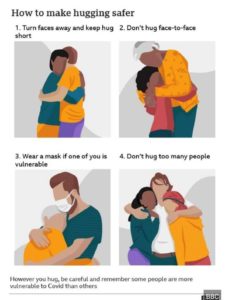The Sue Gray report calls them “gatherings”. “Party” has been used mostly by the media to distinguish between the shameful gatherings of certain people – the parties – and the less shameful gatherings of other people– the after-work drinks. They were shameful because some of the partying people are the very same people that banned parties for the rest of the country, with the support of the after-work drinkers. The need to feel more in control reflects some underlying anxiety – perhaps understandable in the early stages of a pandemic. But you don’t solve anxiety by trying to control increasingly more aspects of life with increasingly more fine-grained definitions. Beyond a certain point, this approach is pathological. It merely perpetuates the problem: there will always be something else to be controlled by even more precise, and impossible, categories.
One way of navigating these metaphysically confusing times is to delve deeper into the metaphysics of parties, groups, substantial meals, or whatnot. This is the path the Sue Gray report and the police investigations will inevitably have to follow. Inevitably, because it is written into the very same laws that prohibited anything different from an after-work drink, anything less than a substantial meal, anything bigger than a six-person group.
Large portions of our lives are messy, like parties and after-work drinks. A pandemic doesn’t change that, no matter how anxiously we try to classify human interactions.
Take the ‘rule of six’. You can hang out with your friends, but no more than 6 people per party. Pardon, per group. If you have more than 5 friends, at some point you might have booked two separate tables at the pub and gone as two separate groups, sitting next to one another. What a Sue Gray report would say about you depends, again, on definitions. Is this a group of more than 6, or is this two groups of 4 sitting next to one another? Does talking to someone at the next table makes us one group? Ultimately, what is a group?
Conversely, the opposition leader drinking beer with his comrades after work was more clearly an instance of after-work drinks. Quite simply, as he said, “a take-away turned up” while they were working. Nothing they could do about it: when a take-away turns up, you take it. With some luck, beer turns up as well. There was no birthday cake, so presumably no birthday party, and probably not much fun either. Lack of fun is a strong indication that there’s not much of a party going on. We shall call these “after-work drinks”.
Socrates used to corrupt the young by challenging them in public fora to precisely define things. What is justice? What is the good? What is a party? With time, that habit went out of fashion and the young are now well protected from uncomfortable questions. Out of fashion, that is, until the Prime Minister attended something like parties at N.10 while the country was in lockdown.
And yet, not all parties are fun, and many parties are not birthday parties – so even the saddest after-work drinks can easily turn into a party before anyone notices it. If we only knew what a party is, that is.
By Alberto Giubilini
For what is a party? Intriguing question, for those into philosophy. You start by thinking you know the answer and you end up confused. For example, it is obvious that not all after work drinks at the pub are parties. But what if you have a beer with your comrades in the office? Or a birthday cake appears during after work drinks? All of a sudden we feel less certain. Maybe the drinks have turned into a party at some point.
Except that, all of a sudden, it does. It’s partygate time.
The fact that our language has not evolved to fit that bureaucratic, micromanaging model reflects the clash between pandemic measures and human ways of thinking, living, and interacting. After all, language is the way we make sense of the world and of our lives. To create norms that don’t fit our ways of speaking, and therefore of thinking, is to create norms that do not make sense. Hence the trouble with defining parties and substantial meals and groups.
With their levels of micromanaging, COVID policies often presupposed impossibly accurate definitions of intimate details of people’s lives. Our vocabulary is not fit for that purpose. ‘Essential travel’ does not capture going to an ill friend’s bedside. ‘Essential service’ does not include communal mourning.
If you’re on some diet, you probably don’t want a substantial meal. Except that we had the ‘substantial meal’ rule. You could not go to the pub for a pint, unless you also had fish and chips or something equally substantial. Crisps or nibbles don’t count. That is because the fish and chips dilute the alcohol and you are less likely to do all those inappropriate things that you do when you have had a pint too many, like talking to strangers. What makes a meal substantial: size, calories, fats, carbs?
This is a rather pleasurable exercise, as long as it doesn’t affect everyday communications. It doesn’t really matter.
There seems to be some confusion these days around what exactly a party is. The Sue Gray report updates on the alleged (i.e. actual) parties at No.10 during lockdowns cast doubts on our certainties.
Often, however, naming can merely give us the illusion of control. It might feel reassuring: having a name for something suggests that we know enough about it to be able to control it. But that cannot work in all cases. Names can only serve certain purposes. They can be sufficiently clear and defined for those purposes – for instance, inviting someone to a party – but not for any purposes – for instance, classifying and defining people’s social interactions

When you want to classify every form of social interaction through clear labels, you need very precise definitions of small details of everyday activities. You hope that in this way they become identifiable and, therefore, controllable. You need each word to be more precise than what is required in normal communications. Micromanaging people’s lives calls for nothing short of that.
So the question matters, after all. Philosophy is back in the public forum. For it is not just about parties. Those of us who like to leave things a bit undefined had to face other dreaded metaphysical questions.
By naming things, we create a conceptual map of the world which helps us manage it and communicate about it to pursue cooperative strategies. Through words, we think about the world in ways that reflect our practical needs. Words can even help us keep the world under some level of control by giving us handy categories for many practical purposes. For example, if we are struggling with poor health, a medical diagnosis – the application of one word to our problems – can often provide clarity, classifying a range of health issues as clearly defined and so perhaps even manageable.
image from the BBC
According to some accounts, “the room was said to have been laid out with Marks & Spencer party food and a birthday cake, with staff singing “Happy Birthday” and staying for 20-30 minutes”. Remarkable level of details. It seems that the Prime Minister was unaware that there would be cake. But this is irrelevant. He might not have organized the party, but he most certainly blew out the candles – itself likely a breach of COVID rules. So he was partying. Lately, new pics emerged of the PM with a bottle of prosecco and tinsel just before Christmas 2020. We shall call it, for lack of a better word, a “Christmas party”.
